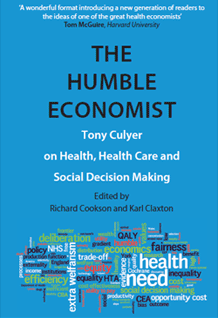The Humble Economist by Tony Culyer
This wonderful collection of essays will allow me - and many others - to continue to learn at the feet of the master
Sir Michael Rawlins, Founding Chair of NICE, UK
Health economics was pioneered at the University of York and the work of one of discipline’s founding fathers Professor Tony Culyer is the subject of a major new publication.
The Humble Economist focuses on important writings of Professor Culyer, who helped set up the UK National Institute for Health and Clinical Excellence (NICE). It distils a powerful set of ideas that have had a profound influence on health policy and decision making, and shows how reason and evidence can be used to improve decision making in any area of social policy. The book comprises twenty-one short essays, selected and revised by Professor Culyer himself, together with an introduction by the editors, Dr Richard Cookson and Professor Karl Claxton, which draws out key themes and provides an overview of Professor Culyer’s life and work. It is available in low cost paperback and ebook formats.
Tony Culyer has worked at the University of York since 1969, and has played leading roles in administration – as a Head of Department, Pro-Vice-Chancellor and Deputy Vice-Chancellor, and in developing the health research infrastructure at York – as well as research and teaching. Tony Culyer’s connection with the Office of Health Economics has also been long and invaluable. He generously has given of his time and talent as chairman of both the Editorial Board, which oversees OHE’s publications programme, and the Policy Board, which sets the general substantive direction of OHE’s research programme.
 Cookson, R. and Claxton, K. eds. (2012) The Humble Economist: Tony Culyer on Health, Health Care and Social Decision Making. York: University of York and London: Office of Health Economics.
Cookson, R. and Claxton, K. eds. (2012) The Humble Economist: Tony Culyer on Health, Health Care and Social Decision Making. York: University of York and London: Office of Health Economics.
Click here to download the Contents and Introduction
The book is published as the Centre for Health Economics (CHE) at York is about to celebrate its 30th anniversary. CHE is the largest and best known group in the world and, working with colleagues in the Department of Economics, it remains at the forefront of the development of new methods and their application for the benefit of society.
York health economists have developed cost-effectiveness analysis methods that are used around the world to determine how best to use resources. These methods measure the costs and benefits of care in a systematic way to determine the advantages of treatments compared to others, taking into account what patients value and how much society is prepared to pay.
Further information
- Centre for Health Economics
- The Humble Economist is available to buy from news.ohe.org/order-the-humble-economist/ and as an ebook from www.amazon.co.uk/Humble-Economist-change-decision-ebook/dp/B00ACFMR6S/ref=sr_1_1?ie=UTF8&qid=1353925611&sr=8-1
